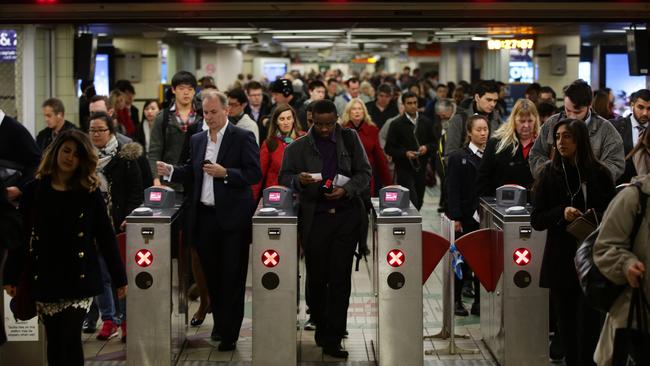Business behind back to work call
Business leaders say the NSW government order for public servants to get back to the office should help other companies that are battling to wean their own workers from their homes.

Business has backed orders for NSW public servants to get back to the office, with retail king Gerry Harvey saying he is surprised flexible work-from-home arrangements across the government and business sectors had gone on for so long.
Mr Harvey, chair of electronics and home retailer Harvey Norman, said his company had never allowed people to work from home after Covid because of his belief employees worked better as a team in the office.
“We never believed it was a good idea,” he said. “Some people were not happy, but we never lost anyone as a result of the policy. I myself like to go into the office.”
He said while there would always be work-from-home arrangements, and in regional areas it made sense, more people would be required to work in the office in the future.
Mr Harvey said he believed big banks were among companies struggling to get workers back into the office. Some business leaders in the retail and finance sectors privately say they want more workers back in the office but are reluctant to lose valuable employees if they come down too hard on WFH policies.
Flight Centre managing director Graham Turner also supports the back-to-the office push, telling staff this week the “default position” was for employees to work from the company’s designated head office, regional office, or shop locations.
“Occasional flexibility may be granted for exceptional circumstances such as family emergencies but normally this won’t be considered a regular arrangement,” Mr Turner said.

ASM Global (APAC) chairman Harvey Lister said the business community wanted people back in the office, not only to boost productivity, but to provide mentorship for the younger generation. “From our company’s point of view, we’ve always preferred to have people working from the office,” said Mr Lister, whose company runs the biggest convention facilities and stadium business in the country.
“We’ve always been very flexible for people who have a need to pick up children from school or have a doctor’s appointment.
“But what we are seeing in the market now in looking for even just reception staff is that people are saying ‘well, we’re interested in the job but we want to work from home Mondays and Fridays’. And of course that just doesn’t work.”
He said company management “needed and wanted” to mentor young people – something that can only be done face to face.
“We find young people more than anybody else are the ones who want to come back in and work,” he said. “They’ve all got careers in front of them, they’re looking for opportunity and they want to be mentored.”
Mr Lister said some sectors of the economy may have to remain flexible in order to retain employees and “they’re going to have to work through that themselves”.
“That’s not the situation for us,” he said. “We’re in the live entertainment business and we need people to work on site.”

Australian Chamber of Commerce and Industry boss Andrew McKellar said the NSW government move was one of common sense and hopefully pointed the way for businesses to see the productivity benefits of having more people work from the office.
“Of course flexibility is not going to go away,” Mr McKellar said. “That needs to be there and employees will continue to make use of that, but there needs to be a balance.”
Large office landlords also have backed the shift with Investa chief executive Peter Menegazzo noting that “connected and vibrant workplaces are not only beneficial for people and culture but also vital for the many small businesses in our city centres”.
Mr Menegazzo said encouraging workers into offices was in line with broader government initiatives to bring cities back to life. Dexus executive general manager Andy Collins called out the benefits of working in offices during the week. “Working flexibly is an embedded practice in the business sector, with the majority of our customers’ employees in the office on most days,” Mr Collins said.
Charter Hall Office chief executive Carmel Hourigan called the shift in government policy “great news”. The group’s funds own buildings in the CBD and Parramatta that house the state government. Ms Hourigan said the buildings had been running at pretty high occupancy levels, “certainly over the last 12 months”.
She cited the strong performance of offices in NSW, Brisbane, Adelaide and Perth. Canberra’s occupancy levels are impacted by the federal public service working from home policy but Ms Hourigan said there was still a lot of activity with government requirements.

ANZ said it had an expectation that employees spend half their time in the office, a policy that had been in place for some time.
Telstra Group executive Kathryn van der Merwe said its approach supports “people to work where, when and how they are the most engaged and productive”. “We aren’t focused on the number of people in the office or at home – our focus is on ensuring we are brilliant at hybrid working,” Ms van der Merwe said.
The Lottery Corporation’s chief people officer Michelle Williams said some of the company’s teams aimed for a minimum number of days in the office or workplace, while for others the nature of the role necessitated working on site all week.
“While our employees have embraced flexibility, they also tell us they value the benefits of catching up face-to-face,” Ms Williams said.



